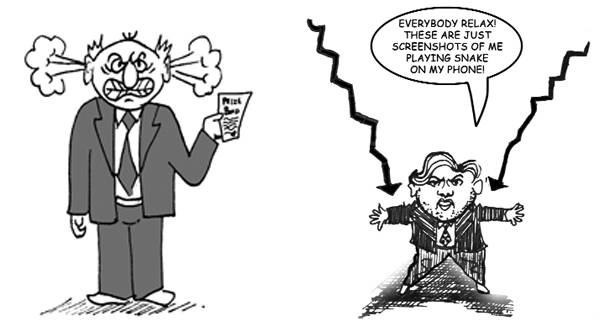
Budget blues
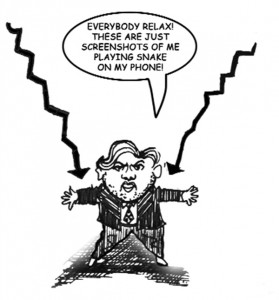
Sir,
If this year’s budget is to reflect the financial policies of the PML(N) government, it means that SROs will not be withdrawn till the end of 2017 – that is, until the government’s tenure is complete. Regrettably, 200 million Pakistanis are fated to live in a country where the political elite and paid public office holders consider Pakistan an ideal country to rule and govern, but not worthy to live or invest in once they are out of power.
Other than mere rhetoric, there will no meaningful attempt by the Federal Board of Revenue to recover or impose direct taxes on affluent traders, retailers and businessmen. The existing laws will likely not be implemented nor any move made to arrest the massive flight of capital from Pakistan, which has not only reached unprecedented levels but is practiced with impunity.
The poor and middle class will be burdened by more indirect taxes and no concrete steps will be taken to punish those who openly evade taxes or file false returns. Our human resources will continue to be neglected as a result of tax evasion, given the paucity of funds for investment in education, health and clean water. The façade of increasing forex reserves by resorting to huge debt procurement will continue, but no attempt will be made to arrest the institutionalized flight of capital, where in just three months this year, over US$ 379 million has been siphoned to Dubai to purchase real estate.
Malik Tariq,
Lahore.
Judges’ results
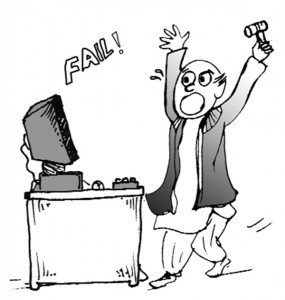
Sir,
The Lahore High Court has finally announced the results of the written competitive examination held to fill 696 posts among civil judges and judicial magistrates. The examination was conducted on 29 March 2015 and 785 candidates have qualified in the written part.
But what was appalling was the slipshod manner in which the results were released. On 3 June, candidates were told via the Lahore High Court’s website to enter their national identity card numbers to obtain their results. Obviously, those who found they had qualified provisionally for the interview stage were overjoyed. The results remained online for a few hours, during which time most candidates had checked their results.
However, that evening they were informed that the declared results had changed owing to a technical website error. To their immense dismay, many candidates who thought they had qualified provisionally now discovered they had been disqualified after all. This begs several questions: why did no one realise that a technical error had gone unresolved for three to four hours? Why were the officials concerned inclined to be careless? Is the High Court really the right authority to conduct these examinations? And how will it ensure that this does not happen again?
This is no mere glitch, but gross negligence on the part of the staff. I would like to request the Honourable Chief Justice of the Lahore High Court that he establishes a team of senior lawyers to verify the transparency of the results and improve the quality of technical staff.
Muhammad Yasir Kayani,
Lahore.
Stand against terrorism
Sir,
There seems to be no relief from terrorist attacks as the bomb blasts, IED explosions, targeted killings, and deadly suicide bombings continue. The international community might suspect Pakistan’s commitment to fighting terrorism, but many Pakistanis feel they are beset by their own capacity constraints and even doubt the support of global stakeholders.
The question is how we can eradicate this thorn in our side. Above all, it will require commitment on the part of all stakeholders of society. Even after a series of bloody operations, there are still sections of society that appear to support the extremist strategies of terrorist groups. I do not know what their intentions may be, but they are clearly working against Pakistan’s betterment.
We need to bring back such people in the right direction using the process of dialogue. Unfortunately, civil society, religious leaders, and parliamentarians are not playing the role they should in the war against terrorism. In times of crisis, religious leaders and civil society must come to the forefront to help the state. We must accept that, in Pakistan, religion has been exploited by many so-called religious leaders. It is high time for the state to take bold steps to make sure this stops.
As an important example, seminaries (madrassas) continue to be used to inculcate hatred for other sects, ethnic groups (the Shias, Ismailis, Hazara) and religions. Many madrassas across Sindh are allegedly promoting terrorism. The government must take action against madrassa managers to ensure that no activities promoting religious extremism are allowed to continue. This means trying to integrate and mainstream madrassa education and to ensure all madrassas are registered with the board of education.
In reclaiming our religion and the values it propagates, we must not remain oblivious to the fact that terrorists too, claim to speak in the name of the same religion and seek to implement the values they believe it espouses. Some militant groups have clearly sectarian agendas, especially against Shia and Sufi orders. They also have links to global terrorist clusters, which have even more dangerous agendas: to undermine governments and capture territory.
Pakistan’s current counterterrorism legal framework is outdated and needs to be overhauled to effectively overcome the challenges posed by terrorism today. It is time to launch an offensive against extremists – as the army is doing now – and they should be given no leverage.
Riaz Hussain Chandio,
Larkana.
Losing currency
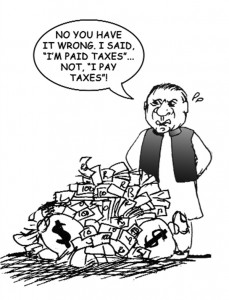
Sir,
Mr Najam Sethi is a respectable journalist and I am impressed with his depth of knowledge on numerous national and international issues. In the episode of Aapas ki Baat aired on 6 June 2015, Mr Sethi discussed in depth Pakistan’s tax evasion problem in the context of the 2015/16 budget. It is appalling to think that only 900,000 people are registered taxpayers out of a total population of 200 million people. This is just 0.45% of the total population and yields a tax-to-GDP ratio that is less than 10% – one of the lowest in the world.
However, I disagree strongly with Mr Sethi’s solution to the tax evasion problem, that is, that the Government of Pakistan should abolish 1,000-rupee and 5,000-rupee currency notes from circulation. Were this to happen, I believe that tax evaders would simply resort to using US$ 100 notes. This would aggravate the problem and result in the dollarization of the economy with serious implications for the country. Our tax evasion problem will only be solved when the rulers of the country start paying their genuine share of tax.
Ejaz Ahmad Magoon,
Lahore.
Right to information
Sir,
In democratic societies, access to information affects the decision-making process. Free and easy access to information on matters of public interest is a hallmark of open democracies. Right-to-information (RTI) laws can best serve the interest of the people by giving them a chance to play a more active role and to take responsibility for helping the government ensure systemic transparency. The government is thus held accountable too. But whether these laws will help strengthen democratic values and prove an antidote to bad governance also depends on how effectively the public makes use of them. The crux of the argument is that, in a democratic society, information helps the public make better decisions and their interest in public affairs in turn, helps the system evolve for the better.
Atta-ullah Shinwari,
Islamabad.
Pakistan’s Mother Teresa
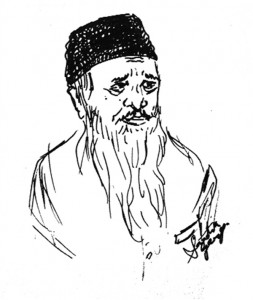
Sir,
Human beings like Mr Abdul Sattar Edhi are a blessing par excellence for Pakistan – a country plagued by corruption, crime, barbarity, ethnic and religious fanaticism, hate speech and a government machinery that is immune to its citizens’ sufferings.
Mr Edhi lives in the real world. He runs the biggest fleet of private ambulances, including helicopters, used to provide relief to the poorest of the poor, the destitute, orphans, and those affected by manmade or natural disasters. He refrains from self-projection through paid advertisements. He refuses to offer free umra junkets to powerful pressure groups. His services to the poor extend beyond Pakistan, but the country’s electronic media has no time to highlight these because he refuses to oblige pressure groups with clout.
On the other side of the coin, some members of the media have tried to project as philanthropists rather than conmen, people alleged to have squirrelled away fortunes in public money and to have gifted palatial villas to controversial politicians. In any other country, the state and private media would have hailed and honoured Mr Edhi as a saint instead of allowing hooligans to rampage through his offices and rob the charity of donations given in trust without any fanfare or publicity.
Malik T. Ali,
Lahore.
Poem
It consumes you!
Hate consumes a heart like fire does dry wood
Hate smothers good as winter the green
Hate freezes all warmth and goodness
Hate breaks up families and places of security
Hate turns brothers and neighbours into foes.
Hate turns women into victims
Hate turns people not of us into “the Other”
Hate turns people of other faiths into enemies
Hate has been the reason to kill, to destroy the world.
Enough! Enough! Enough!
No more hatred, no more bloodshed, no more “Othering”!
Let God’s way into ourselves instead of the evil that is this hateable hate
Let compassion enter where there is hardness of heart
Let warmth enter where there is coldness towards the “Other”
Let understanding enter where there is utter ignorance
Let God enter your heart and
Let your heart be the home of higher values, such as LOVE!
Love, that saints sing about and prophets recommend as the soul’s cure.
Now go discover what love is!
Amineh Hoti,
Lahore.
The prize goes to…
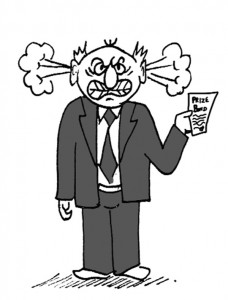
Sir,
Given that the State Bank expects high professional standards from other commercial banks, it is appalling to have to undertake a visit to one of its branch offices, especially that located in Islamabad.
First, there is no proper parking space for the hundreds of people who visit the branch daily. The only available parking in front of the bank turns into a large puddle during the rains. Second, the staff are overtly rude, especially those dealing with prize bonds. It takes no less than three visits to collect a prize: the first visit to file a claim (taking on average 20–25 minutes per person, including senior citizens); the second to collect the prize money itself; and the third to collect the relevant certificate for income tax deducted from the prize money.
Third, there is no transparency in this. While the highest prizes are worth tens of millions of rupees, one never hears in the press who the lucky winners are. Compare this with lotteries held in the West, where winnings are heavily publicized. Fourth, the sale of prize bonds is stopped two months before thle date of draw. What is the logic of holding them back in the bank’s vault? The sale of bonds should continue until they are sold out. Holding them back may invite corruption and manipulation. Finally, a 15% tax is deducted from the winnings irrespective of whether the winners are filers of income tax returns or not. This contravenes the government’s stated policy.
P S Ahmed,
Islamabad.
Parrikar provokes
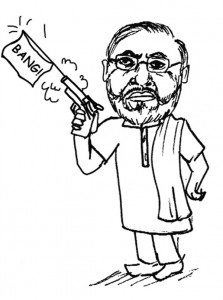
Sir,
The recent inopportune and highly provocative statement made by Indian Defence Minister Manohar Parrikar in New Delhi – that terrorists should be used to “neutralize terrorists” – has left everyone at the helm in Pakistan aghast. Pakistan’s reaction to the irresponsible statement of a person of no less stature than the Indian Defence Minister was naturally one of shock.
The adviser to the Prime Minister on foreign affairs, Mr Sartaj Aziz, did not waste a second in responding to Mr Parrikar’s statement. He expressed Pakistan’s immediate concern, pointing out that the comment merely confirmed Pakistan’s apprehensions that India was involved in terrorist activities on the former’s soil. Pakistan has long voiced this concern and its assertions have gained strength in the recent spate of statements from senior Indian civilian and military officials.
Against the backdrop of these developments, it seems appropriate to assume that Mr Parrikar’s comment strongly backs Pakistan’s earlier assertions. That such unusual and unexpected comments should come from a senior official in any government cannot be unintentional. Responding to his counterpart’s comments, Pakistan’s Defence Minister, Khawaja Asif, endorsed Mr Aziz’s statement in response to India’s palpable admission of sponsoring terrorism in Pakistan. If this is indeed what Mr Parrikar’s remarks seem to suggest, they have not yet been denied – or even clarified – by the Indian government.
In order to ensure damage control, it would be wise on the part of the Indian government to promptly clarify the situation. It would also be in the interest of both countries to curtail the outburst of allegations and counter-allegations as far as possible. Perhaps this is the only way they can ever hope to improve the deteriorating bilateral relationship and bring progress and prosperity to their people and the region.
M. Fazal Elahi,
Islamabad.

